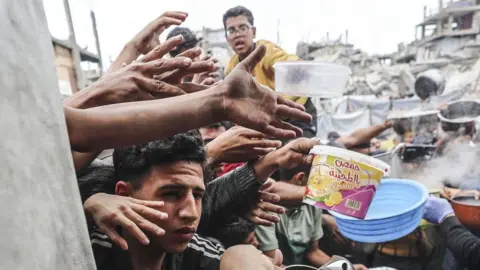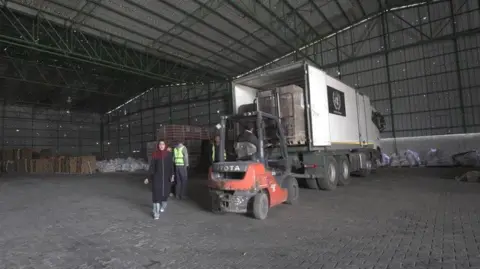UN agency runs out of food aid in Gaza after Israeli blockade
 Getty Images
Getty ImagesThe UN World Food Programme says it has depleted all its food stocks in Gaza, where Israel has blocked deliveries of humanitarian aid for seven weeks.
"Today, WFP delivered its last remaining food stocks to hot meals kitchens," it warned. "These kitchens are expected to fully run out of food in the coming days."
Israel cut off aid on 2 March and resumed its offensive two weeks later after the collapse of a two-month ceasefire, saying it was putting pressure on Hamas to release its remaining hostages.
The UN says Israel is obliged under international law to ensure supplies for the 2.1 million Palestinians in Gaza. Israel says it is complying with international law and there is no aid shortage.
At the end of March, all 25 bakeries supported by the WFP in Gaza were forced to close after wheat flour and cooking fuel ran out. Food parcels distributed to families containing two weeks' rations were also exhausted.
Malnutrition is also rapidly worsening, according to the UN. Last week, one of its humanitarian partners screened 1,300 children in northern Gaza and identified more than 80 cases of acute malnutrition - a two-fold increase from previous weeks.
The UN Office for the Co-ordination of Humanitarian Affairs (OCHA) says there are also severe shortages of medicine, medical supplies and equipment for hospitals overwhelmed by casualties from the Israeli bombardment, and that fuel shortages are hampering water production and distribution.
World Health Organization (WHO) director-general Dr Tedros Adhanom Ghebreyesus said "an awful and grim moment" had been reached in Gaza.
"This aid blockade must end. Lives depend on it."
The WFP said the current Israeli blockade – the longest closure Gaza has ever faced – had exacerbated already fragile markets and food systems.
Food prices had skyrocketed by up to 1,400% compared to during the ceasefire, and the shortages of essential commodities raised serious nutrition concerns for vulnerable populations, including children under five, pregnant and breastfeeding women, and the elderly, it warned.
"The situation inside the Gaza Strip has once again reached a breaking point: people are running out of ways to cope, and the fragile gains made during the short ceasefire have unravelled. Without urgent action to open borders for aid and trade to enter, WFP's critical assistance may be forced to end," the agency said.
"WFP urges all parties to prioritize the needs of civilians and allow aid to enter Gaza immediately and uphold their obligations under international humanitarian law."
More than 116,000 tonnes of food assistance - enough to feed one million people for up to four months - is positioned at aid corridors and is ready to be delivered as soon as Israel reopens Gaza's border crossings, according to the agency.
In the meantime, WFP Country Director Antoine Renard told the BBC the agency was trying everything it could to keep the hot meals kitchens running.
"More than 80% of the population... have been displaced during the war. And just since 18 March [when the Israeli offensive restarted], you've got more than 400,000 people who have been displaced once again," he said.
"Every time you move, every time you lose assets. So these kitchens are so essential for people to have a basic meal."
However, even when fully supplied, the kitchens have been reaching just half the population with only 25% of daily food needs.
Gavin Kelleher, humanitarian access manager with the Norwegian Refugee Council, told the BBC from central Gaza that once the kitchens' food stocks ran out they would no longer able to provide anything.
To survive, he said, people were eating less, bartering to "exchange a bag of diapers for lentils or cooking oil", or selling what belongings they have left to try to get cash to access remaining food supplies.
He added that begging was also taking place on a scale not seen before in Gaza, but that people were not able to give to others anymore.
"The desperation is really, really severe."
 WFP
WFPEarlier this week, the Israeli foreign ministry rejected criticism of the blockade from the UK, France and Germany, which called it "intolerable" and demanded it end immediately in a joint statement.
The ministry said more than 25,000 lorries carrying almost 450,000 tonnes of aid had entered Gaza during the ceasefire, adding: "Israel is monitoring the situation on the ground, and there is no shortage of aid in Gaza."
It also said Israel was not obliged to allow in aid because Hamas had "hijacked" supplies "to rebuild its terror machine".
Hamas has previously denied stealing aid and the UN has said it has kept "a very good chain of custody on all the aid it's delivered".
Last week, Hamas rejected an Israeli proposal for a new ceasefire, which included a demand to disarm in return for a six-week pause in hostilities and the release of 10 of the 59 hostages still in captivity. The group reiterated it would hand over all of the hostages in exchange for an end to the war and a full Israeli withdrawal.
The Israeli military launched a campaign to destroy Hamas in response to an unprecedented cross-border attack on 7 October 2023, in which about 1,200 people were killed and 251 others were taken hostage.
At least 51,439 people have been killed in Gaza since then, according to the territory's Hamas-run health ministry.
